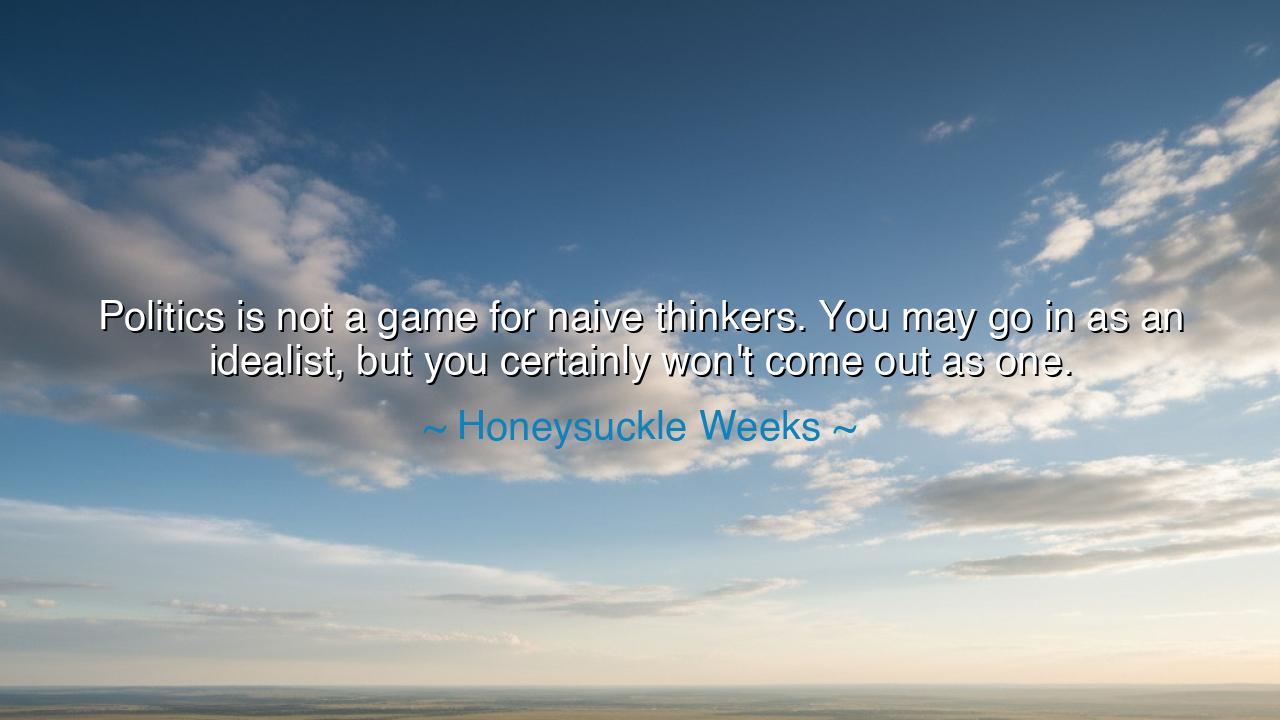
Politics is not a game for naive thinkers. You may go in as an
Politics is not a game for naive thinkers. You may go in as an idealist, but you certainly won't come out as one.






Hear, O children of discernment, the sobering words of Honeysuckle Weeks: “Politics is not a game for naive thinkers. You may go in as an idealist, but you certainly won’t come out as one.” In these words lies a truth carved from the heart of experience—that the world of politics, though cloaked in noble promises, is a realm where innocence is swiftly tested, and where ideals are often ground down by compromise, rivalry, and the relentless weight of reality.
For the naive thinker believes that truth alone will prevail, that justice, once spoken, will be embraced. But politics is not a temple of purity; it is a battlefield of interests, where cunning outpaces sincerity, and where power often bends principle to its will. Thus the idealist, who enters with shining vision, finds themselves surrounded by intrigue, betrayal, and necessity, and in the crucible of struggle, innocence gives way to hard-earned wisdom—or despair.
History offers countless examples of this harsh transformation. Recall Thomas Jefferson, who wrote of liberty and equality in the Declaration of Independence, yet as president found himself compromising with the very forces he once decried. Or Woodrow Wilson, who dreamt of a League of Nations to secure eternal peace, yet saw his vision crushed by the bitterness of politics at home. Both began with ideals, but the grind of politics left them marked by the shadows of disillusion.
Consider also the tale of the French Revolution, where men entered with fiery ideals of liberty, equality, fraternity. Yet as the years passed, those same dreamers oversaw the Reign of Terror, consumed by suspicion and power. What began as pure vision dissolved into bloodshed and fear. Thus Weeks’s words echo across centuries: one may enter politics with high hopes, but rarely emerge unchanged.
Therefore, O seekers of wisdom, let this be your understanding: to walk the path of politics is to tread a road of thorns. It does not mean that ideals are worthless, but that they must be guarded fiercely, for the world will press hard against them. The wise learn to hold vision in one hand and realism in the other, lest they lose themselves entirely. For if innocence cannot survive untouched, integrity can still endure, if the heart remains steadfast.






THTuong Ho
The idea that politics transforms idealists into something less idealistic is quite powerful. Does this imply that the political system is inherently corrupting, or is it a sign of the challenges faced by those who wish to create change? Is there a way to remain idealistic and still succeed in politics, or must one adapt to the harsh realities of political life and its inevitable compromises?
A2Adamtv 2 Adamtv 2
Honeysuckle Weeks’ observation about idealism and politics highlights the tension between personal values and the need for political maneuvering. If an idealist enters politics, will they inevitably become more pragmatic or cynical, or is there a way for them to hold onto their ideals without being compromised? Can someone truly make meaningful change in politics while sticking to a purely idealistic approach, or is it bound to lead to frustration?
MTNguyen thi minh tu
This quote raises an interesting point about the transformation that occurs when people engage with politics. Does political experience inherently lead to disillusionment, or can it sharpen one's ability to navigate the complexities of the world? Is the loss of idealism an unavoidable part of growing up, or can individuals remain true to their original principles despite the pressures and compromises politics demand?
Kkimchung
Weeks’ quote seems to suggest that politics inevitably changes those who enter it with idealistic views. Can politics ever truly align with idealism, or do the harsh realities of governance force even the most passionate idealists to compromise? How do we strike a balance between staying true to our ideals while navigating the pragmatic challenges of political life? Is it possible for idealists to maintain their beliefs, or is compromise the only way forward?